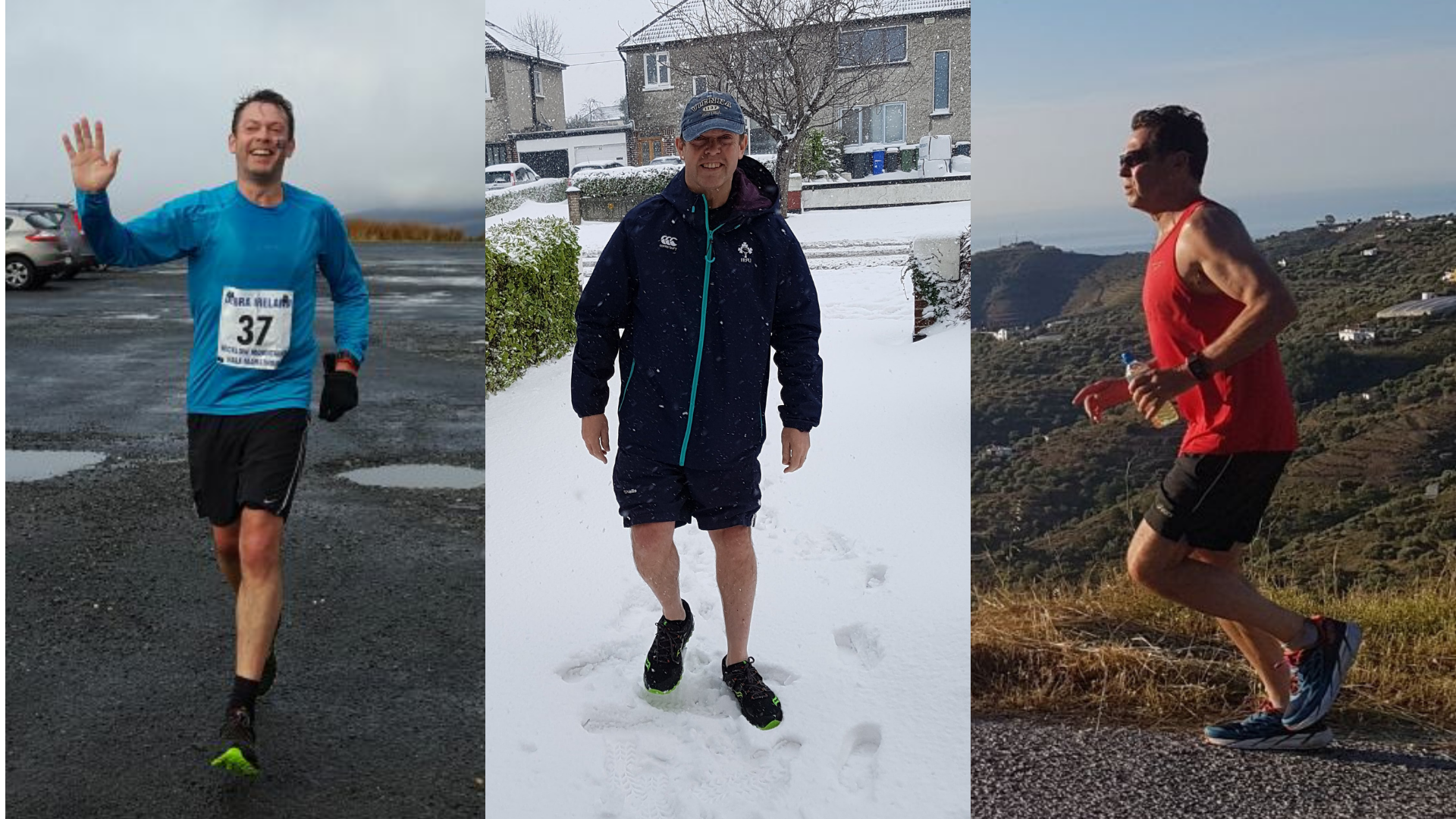Short-sighted about your long runs?
It’s never nice to lose something. It’s especially difficult when that something is a body part. I came home from a particularly arduous, hilly, long run one day and couldn’t wait to get my shoes off. For the last few miles I had a small stone in my shoe. Big enough that it made its presence felt but not so big that I had to stop and deal with it. I got undressed for a shower and shook out my sock. Turns out the stone was a toenail that was no longer attached to me (even if I was still attached to it, or the idea of it anyway).
Over the years many toenails have gone the same way.
I don’t recall if they were ever beautiful, but beautiful is certainly not an adjective I ever foresee myself using to describe my feet for my remaining time on earth. The long run is hard on your feet. Black toenails, that eventually detach, are to be expected.
Anyone I have coached will know that I don’t skip the long runs. To me, they are the most important part of your training for an event. It doesn’t matter if that event is your first 5km or your first 100 mile race. Your weekly long run helps you to build confidence, endurance, physical fitness, mental strength and cardiovascular health.
It also has one other important role to play. Getting you prepared for race day. If you’re not taking full advantage of your long runs, then you’re leaving a huge advantage behind. Think of each long run as though it’s race day. Not in terms of pace, but everything else. Like the Scouts say, ‘Be Prepared’. Think of all the elements that make up your race from hydration to gear and everything in between and build yourself a system that’s tried and tested by the time race day rolls around.
If only that were true!
Nutrition
Break nutrition into three categories; before, during and after. The aim is to figure out what to eat, when to eat and how much to eat in a way that suits you. Play around with different food types until you find things that don’t upset your stomach. In training, you’ll need to decide if you’re going to map a route that loops past your car or house so you can stop in for food, or if you’ll carry it with you.
If you’re working towards a marathon, chances are the event will have food stations along the route. You’ll need to decide if the food they will have on offer is something you want to eat, or if you’re going to carry your own food.
On longer events it’s likely you’ll look after your own food.
I like to eat food rather than food substitutes, like gels. After much trial and error, I found that soup, dolmades, fruit, peanut butter and a particular vegan sausage sandwich all worked for me.
You’re aiming to consume somewhere between 200 and 350 calories an hour. Your body won’t tolerate much more than that over a long period of time as you bounce up and down. Unfortunately, you’ll be burning a lot more than that, anything from 400 to 600 calories per hour depending on a number of factors including your metabolism and the pace you are running at. So, yes, you will have a calorie deficit by the end of the race but you can help to keep ‘bonking’ at bay by topping up your calories from early in the run with foods that sustain you.
Hydration
Like nutrition, you need to think about starting your training adequately hydrated, staying hydrated during the run and getting enough liquid in afterwards to rehydrate yourself. As with food, you need to see if carrying it with you is something you can manage or will you loop past a water stop?
The length of your run will dictate your fluid needs. Typically I aim for 500 ml of water, or water and electrolytes, per hour. As with food, I avoid sports drinks and instead add electrolyte tablets, or electrolyte drops, designed for sport, to my water. You can also add electrolytes to your water after your training to help recovery.
Maintaining hydration as a runner is important for health and performance. Water regulates our body temperature, removes waste, helps bring energy to our cells and cushions our joints. Adequate hydration can improve recovery, minimise injury and cramping, and maximise performance. Most runners know about sodium, but sweat also contains chloride, magnesium and potassium, which play a pivotal role in maintaining fluid balance and muscle function. A deficiency in these minerals can exacerbate the symptoms of dehydration and cause muscle cramps.
Dehydration causes your blood volume to drop. This forces your heart to beat faster as your oxygen carrying capacity drops. This can cause a lack of coordination, thirst, fatigue, dry mouth, headache and nausea. Not to mention severe cramps.
Mental Training
Mental fitness tools are your superpowers. If you’re not preparing mentally in your training, you cannot expect to have these superpowers available to you come race day. Self-talk, mental resilience and visualisation are some of the tools I work on regularly and rely on come race day. I’ve written about these in more detail in the blog posts linked above.
Gear
Bleeding nipples, blistered feet and chafing of my nether regions are just a few of the painful wardrobe malfunctions that have ruined my enjoyment of events. I will make this one very simple. Don’t wear anything new on race day, that you haven’t worn regularly in training.
Gadgets
I think it was Shakespeare that wrote ‘To carry a phone, or not to carry a phone, that is the question’. You may decide that it’s safer to have your phone with you and, usually, putting it in an armband or running belt is the easiest way to carry it. Like gear, try these out in advance and make sure they’re sitting comfortably.
Whether you prefer to listen to the sounds around you or get totally into your own world with music, podcasts or audiobooks, you should find what works in training on your long run. Maybe a particular playlist gives you a lift when you’re flagging or taking yourself off to another world in an audiobook, is your preferred way to pass the miles. Bear in mind, come race day you may enjoy being more in tune with your surroundings, whether that’s listening to the support from the crowds of a city marathon or chatting to another runner in a longer event like an ultra marathon.
Weather
Calling all fair weather runners! It’s time to get out of your comfort zone. If you wake up on a Saturday morning with the intention of doing your long run, don’t let rain lashing on your bedroom window get in your way. Training in all sorts of conditions from snow to sunshine, rain and hail to gale force winds, will build confidence, mental strength and will put your gear to the test. I know from experience that it wasn’t until I ran in a particular shirt in the rain that my nipples got chafed and started bleeding. There’s no better practice for race day either as that’s one element that will be totally out of your hands.
Run. Whatever the weather.
Time
A quick thing to think about. If you always run in the evening, but the event you’re training for starts at 9am, you may find you don’t perform at your best on the day. While you won’t need to do all your long runs at ‘race day time’, it’s something that certainly worth practicing. Particularly in terms of your nutrition. If I have a long run, or a race, early in the day, I typically want to eat about three hours beforehand. This might mean getting up at 5am to eat. Something worth thinking about.
Buddies
There’s plenty of suffering through the long miles of training for an event. One of the reasons why runners become close friends is because they spend time together, often in silence, suffering. I have a bond with some runners that only comes about from revealing our raw selves. When you are at your most vulnerable, all your barriers come down and the invisible lines of day to day self protection can crumble. Your deepest fears and hurts and inner ghosts can be shared as easily as ‘pass the butter’ (vegan butter, obviously).
Running on the Cliff Walk in Howth, Co. Dublin. Your long run will bring you to new places, if you let it.
Dig Deep
From that place, that deep well inside us, come great gifts that could not be reached from staying in our comfort zone. Strong friendships that cannot be built from sharing only cups of coffee and glasses of wine, confidence that cannot be built without challenging ourselves beyond what we believe possible, mental strength that will get us through challenges in life, far from the path we tread in training.



